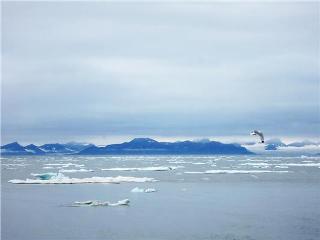Apr 21 2015
Ocean and Earth Science researchers from the University of Southampton were part of an international team of scientists to reveal how the interplay between ocean currents and marine microbiology serve to regulate potentially damaging emissions of the potent greenhouse gas methane, created beneath the Arctic Ocean.
 Univ of Southampton - study site offshore West Spitsbergen (photo by Carolyn Graves, UoS)
Univ of Southampton - study site offshore West Spitsbergen (photo by Carolyn Graves, UoS)
PhD researcher Carolyn Graves and Dr Rachael James, Associate Professor in Marine Geochemistry, are co-authors of a study entitled ‘Water column methanotrophy controlled by a rapid oceanographic switch’ published this week in Nature Geoscience. The study reveals that fast ocean currents promote methane escape into the atmosphere, because they inhibit the growth of marine bacteria which consume significant amounts of the gas.
Carolyn Graves, who is based in the Graduate School of the National Oceanography Centre, took part in an expedition on board the German research vessel Maria S. Merian in August 2012 and mapped the distribution of methane released from the seafloor offshore West Spitsbergen. Her supervisor, Dr Rachael James, was a member of the team that first discovered the methane seeps in 2008. Dr James helped design the expedition together with colleagues from the University of Basel (Switzerland) and GEOMAR (Helmholtz Centre for Ocean Research, Germany).
Large amounts of methane are stored in the seafloor in this area as gas hydrate, a solid, ice-like substance that consists of frozen methane and water. When the hydrates dissolve, methane can find its way through the sediments and be released into the water where it ascends to the sea surface. It has been known for some time that marine bacteria can consume some of the methane, but the research done in this study shows that ocean currents have a major control on how much methane escapes to the atmosphere.
Sets of seawater were collected from a series of sampling stations, several days apart, as part of the study.
“My analyses of methane concentrations on board the ship showed that they changed significantly over the sampling period, along with other parameters, including seawater temperature and salinity,” said Carolyn, second author on the study.
Analyses done by another PhD student, Lea Steinle from the University of Basel, also showed that there were drastic changes in the level of activity of methane-consuming bacteria.
“The next step,” explained Dr James, “was to figure out the reasons for these changes.”
Working with oceanographers from GEOMAR, the team took a closer look at the region using a high resolution ocean model. The model indicated that the changes in methane concentration, activity level of bacteria, and oceanographic parameters, were linked to shifts in the West Spitsbergen Current – a fast, warm and salty current that delivers water from the Norwegian Sea to the Arctic Ocean.
“It usually runs over the area of the methane seeps but every so often it moves, in a matter of days, further offshore, and is replaced by water that comes from closer to the coast,” explains Prof. Arne Biastoch (GEOMAR).
The coastal waters have much higher populations of methane-consuming bacteria, because they are slow-flowing, supporting their growth. Most (around 85%) of the time, however, the currents over the methane seeps are strong, preventing build-up of methane-consuming bacteria, increasing the likelihood for methane escape to the atmosphere. To test whether this is important in other regions affected by seafloor methane seepage, the scientists used a second global ocean model.
“We found that strong, fluctuating, currents were common above methane seeps, meaning that methane-consuming bacteria may not be as effective for regulating emissions of methane to the atmosphere as previously thought,” Dr James concluded.